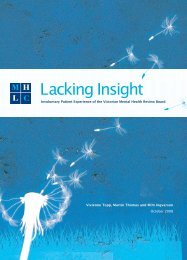Reducing Ethnic Profiling in the European Union - Open Society ...
Reducing Ethnic Profiling in the European Union - Open Society ...
Reducing Ethnic Profiling in the European Union - Open Society ...
- No tags were found...
You also want an ePaper? Increase the reach of your titles
YUMPU automatically turns print PDFs into web optimized ePapers that Google loves.
The clear risk of arbitrar<strong>in</strong>ess <strong>in</strong> <strong>the</strong> grant of such broad discretion to <strong>the</strong> policeofficer. While <strong>the</strong> present case does not concern black applicants or those of Asianorig<strong>in</strong>, <strong>the</strong> risks of <strong>the</strong> discrim<strong>in</strong>atory use of <strong>the</strong> powers aga<strong>in</strong>st such persons isa very real consideration […]. The available statistics show that black and Asianpersons are disproportionately affected by <strong>the</strong> powers. 272Similar concerns were echoed <strong>in</strong> <strong>the</strong> judgment <strong>in</strong> <strong>the</strong> case of Marper v. UnitedK<strong>in</strong>gdom (a case which ruled that United K<strong>in</strong>gdom practices of ga<strong>the</strong>r<strong>in</strong>g and <strong>in</strong>def<strong>in</strong>itelystor<strong>in</strong>g DNA, <strong>in</strong>clud<strong>in</strong>g of persons never charged or convicted, violated privacyrights) which noted <strong>the</strong> over-representation of ethnic m<strong>in</strong>orities <strong>in</strong> <strong>the</strong> database. 273The court’s rul<strong>in</strong>g <strong>in</strong> Gillan and Qu<strong>in</strong>ton v. <strong>the</strong> United K<strong>in</strong>gdom establishes thatstop and search must be based on reasonable suspicion <strong>in</strong> order to meet standards oflawfulness and respect privacy rights, and that United K<strong>in</strong>gdom counter-terrorism lawsgrant<strong>in</strong>g <strong>the</strong> police broad powers to stop and search persons without any requirementof reasonable suspicion are unlawful. 274 In this case, <strong>the</strong> <strong>European</strong> Court of HumanRights held that:[T]he powers of authorisation and confirmation as well as those of stop andsearch under sections 44 and 45 of <strong>the</strong> 2000 [United K<strong>in</strong>gdom Prevention ofTerrorism] Act are nei<strong>the</strong>r sufficiently circumscribed nor subject to adequate legalsafeguards aga<strong>in</strong>st abuse. They are not, <strong>the</strong>refore, “<strong>in</strong> accordance with <strong>the</strong> law”and it follows that <strong>the</strong>re has been a violation of Article 8 of <strong>the</strong> Convention.” 275Police <strong>in</strong> many EU countries have broad powers to conduct stops and searches,<strong>in</strong>clud<strong>in</strong>g under special preventive powers authorized for specific times and places. Allsuch powers should be reviewed to assure compliance with standards established <strong>in</strong>Gillan. 276Immigration Enforcement Powers and Deficits <strong>in</strong>Current Non-Discrim<strong>in</strong>ation Provisions<strong>European</strong> law does not apply similar protection aga<strong>in</strong>st discrim<strong>in</strong>ation <strong>in</strong> <strong>the</strong> realm ofimmigration enforcement. Current EU immigration law creates an exception <strong>in</strong> <strong>the</strong>protection of third country nationals under Article 3.2 of <strong>the</strong> Racial Equality Directive(Council Directive 2000/43/EC) which derogates <strong>the</strong> pr<strong>in</strong>ciple of non-discrim<strong>in</strong>ation,allow<strong>in</strong>g for differences of treatment on grounds of nationality, immigration process,196 APPENDIX B: LEGAL STANDARDS AND CASE LAW
















